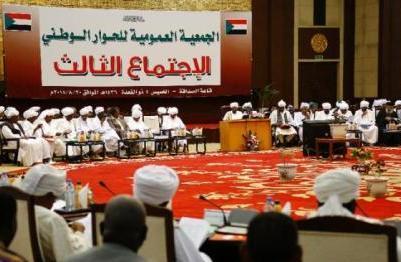Sudan’s dialogue body rejects AUPSC’s call for pre-dialogue meeting
September 4, 2015 (KHARTOUM) – The ad hoc committee formed by the dialogue coordination body known as 7+7 to mull over the African Union Peace and Security Council (AUPSC) recent decision on national dialogue has recommended its rejection saying it was unfortunate and would hinder the whole process.

Last month, the AUPSC issued a decision demanding the government and the rebels to declare a ceasefire in Darfur, South Kordofan and Blue Nile and calling for holding a pre-dialogue meeting outside the country.
A source within the 7+7 mechanism on Friday told Sudan Tribune that the committee formed to consider the AUPSC decision had already submitted its recommendation, saying the decision will be revealed within a few hours.
The same source, which requested anonymity, pointed that the recommendation rejected the transfer of the dialogue abroad, saying it considered the decision of the AUPSC “inappropriate, unfortunate and would hinder the dialogue process”.
According to the source, the recommendation demanded that foreign interventions should be positive and promoting for the national dialogue, noting the committee’s decision was driven by mere national reasons.
He denied the recommendation of the committee was influenced by the decision of president Omer Hassan al-Bashir and the NCP to refuse the proposed pre-dialogue meeting in Addis Ababa, saying the national forces had previously mulled over the AUPSC decision and referred the issue to the 7+7 mechanism to decide on it.
Relationship between Khartoum and the AU became strained after the AUPSC organized a hearing for the opposition “Sudan Call” forces on 24 August 2015 which led the former to condemn the move and describe it as “outrageous initiative” declaring its refusal for any foreign involvement in the process.
DIALOGUE BODY HOPEFUL OF HOLDING INCLUSIVE PROCESS
Meanwhile, the 7+7 mechanism stressed the recent meeting with Bashir allowed political forces which have ties with the rebel groups to invite them to join the dialogue, disclosing that some leaders agreed to participate in the process.
The member of the 7+7 mechanism from the government side and head of the subcommittee for creating conducive environment, Aboud Jaber, said the opposition parties and the rebel groups didn’t reject the dialogue but set some conditions, stressing that prerequisites would hamper the process.
He called upon all parties which rejected the dialogue to engage in the process directly in order to achieve solutions for the entire Sudanese issues.
Jaber told the pro-government Sudan Media Center (SMC) that the armed groups have agreed to join the dialogue, stressing the need for holding an exclusive Sudanese dialogue inside the country.
He said the 7+7 mechanism have not lost hope that all political parties and armed groups would participate in the dialogue and achieve consensus in all issues.
The “Sudan Call” forces including the armed groups say the pre-dialogue meeting is a necessary step before to join the internal process.
Bashir launched the national dialogue initiative in January 2014 but the process suffered major setbacks after the withdrawal of the opposition National Umma Party (NUP) and the non-participation of the rebels as well as leftist forces.
(ST)
